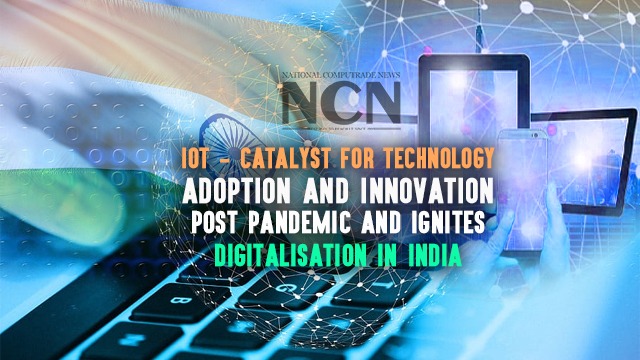When the entire world had been in the clutches of Covid 19, ban on travel and public gathering affecting operations has led to the rapid growth of digitalisation. While the restrictions had disrupted the entire supply chain, manufacturing, businesses have given rise to the need for radical shifts in workflows and restructuring of business models.
The government and business leaders in India have harnessed the opportunities offered by technology and its implications on the future of work. Focusing on adopting digital and investing in new products and services that enable them to thrive in the fast-evolving technologies are the prime focus areas of the companies.
Manufacturing modernisation relies on a set of technologies clubbed as Industry 4.0. Deloitte Global’s third annual survey1 also took a closer look at Industry 4.0 technologies that could be CXOs’ imminent priorities and have the greatest impact on their organisations

Courtesy KPMG Report
IoT, AI, cloud, and big data/analytics are the ‘big four technologies’ that could provide the basis to connect organisations, generate data, and drive more intelligent operations and they are used for agility. Using its sensors, network, and analytics, IoT provides the core tools to automate data collection and generate insights. These are some of the most important It is the most important component in the digital stack.
Across the world, spending on software and hardware related to IoT is projected to grow rapidly, from US$726billion in 2019 to US$1.1 trillion in 2023, according to a market research report. A recent IoT industry spending report reveals that Asia/Pacific accounted for most of the spending on IoT in 2019, with India spending US$20.6billion.

Courtesy KPMG Report
The majority of the IT companies are working from home now. On the other side, the manufacturing industry is still lagging in implementing automated, data-driven control systems.
The global IoT market is projected to grow from $381.30 billion in 2021 to $1,854.76 billion in 2028 at a CAGR of 25.4% in the 2021-2028 period. With the integration of smart and data-driven technologies into the production & administration environment, manufacturers can monitor business processes from anywhere/with less manpower. As the supply chain is disrupted and short-term business plans will no longer work, the first important thing for manufacturers is survival. The use of real-time data, constant collaboration with partners, distributors, and managers is vital. Updates on supply chains help manufacturers identify upcoming trends and risks so that they can take collective steps to handle the crisis effectively.
The use of IoT helps organizations increase productivity and bring transparency across the channels using interconnected, intelligent, and safe devices. While everyone had to abide by the new normal, like social distancing and self-isolation, manufacturers have to use more digital options to conduct business operations. Adopting AR/VR technologies in the production environment help personnel in training, perform any maintenance activity remotely, or analyze problems effectively. Half of the workforce required to work from home and hence, the adoption of immersive technologies like AR/VR should be considered strategically important for better understanding
The IoT has radically changed the landscape of IT. Remote-monitoring of equipment, machinery, and production setup and vision-based control systems to control equipment have helped manufacturing sector. Video-conferencing for effective and real-time collaboration has helped to keep people connected. Workforce-tracking to ensure employee well-being and monitor activities is the key to success of millions of organisations. Machine-Learning software to intelligently perform automated tasks is another aspect which got explored. IoT-enabled sensors and devices to offer a holistic view of processeshelp companies observe 360-degree-view of their operations.
In recent years, IoT has gained convincing research ground as a new research topic in a wide variety of academic and industrial disciplines, especially in healthcare. The IoT revolution is reshaping modern healthcare systems, incorporating technological, economic, and social prospects. It is evolving healthcare systems from conventional to more personalized healthcare systems through which patients can be diagnosed, treated, and monitored more easily.
IoT technologies offer tremendous growth opportunitiesand India has set the stage for becoming an IoT powerhouse.









